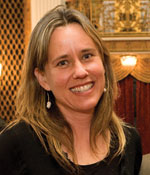Having been to court that day for a second stay of execution that was denied, “AR” came to the Justice & Diversity Center’s (JDC) Homeless Advocacy Project (HAP) Intake Clinic on a Tuesday.
The Sheriff was scheduled to come the following day to evict her and her family from their apartment.
AR lives with her 20-year old disabled daughter, and her sons, ages 11 and 27. She is the In Home Support Services (IHSS) caretaker for her profoundly disabled, bedridden daughter. Her IHSS income and her daughter’s SSI income are the sole sources of income for the family.
The family had fallen behind in the rent due to medical expenses not covered by MediCal, as well as the challenges of living in poverty. They had been given a stipulated agreement but had fallen out of compliance and a judgment was entered against them.

HAP Supervising Attorney Katie Danielson thought it unlikely that she would be able to prevent the family’s eviction but agreed to attempt to advocate on their behalf in case the eviction did not go forward. In a great stroke of compassion, due to the desperate situation and the challenges inherent in maintaining the daughter’s care, the Sheriff’s Department chose to give the family an additional week on their own authority.
Danielson reached out to the landlord and they agreed to give the family more stays of execution to give her time to get the family rental assistance and a viable structure toward payment of rent in the future.
Upon closer examination of the file, Danielson realized the rent had been improperly calculated by the San Francisco Housing Authority (SFHA) for a six-month period. With the assistance of the property management company, HAP was able to document the discrepancy and SFHA credited a significant portion of the back rent, decreasing the amount owed.
The Q Foundation, another non-profit in the community, was able to pay the remaining amount.
While the case was proceeding, Danielson attended a large meeting of housing advocates. During the meeting, attorney Deborah Gettleman from Disability Rights California presented on a little-known income exemption applicable to family members caring for developmentally-disabled children in HUD-funded housing, when their income was from IHSS. The policy’s intent is to provide incentives to family members to provide care at home, resulting in a decrease in need for institutionalization, better care at home, as well as lower cost to taxpayers.
Using Gettleman’s research, Danielson wrote a brief and sent it to SFHA, resulting in the exemption of the client’s income and a dramatic decrease in the rent. This will lead to a much higher quality of life for the family.
Consequently, the case was dismissed and the rent is automatically paid by a payee each month.
To learn more about the work of the Homeless Advocacy Project visit www.sfbar.org/hap.




